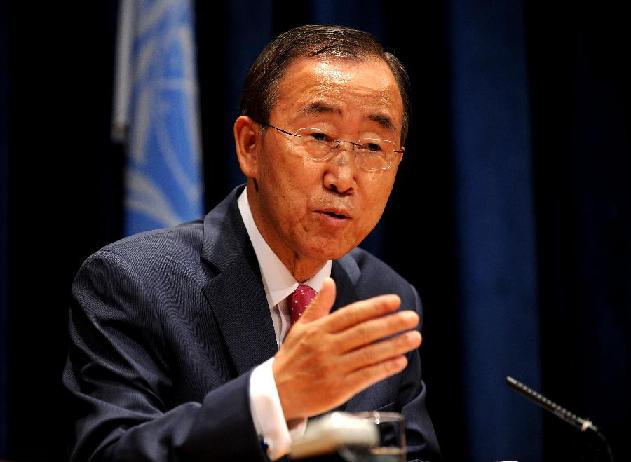
Ban: Palestine's UN status to be decided by member states
Xinhua, September 16, 2011
-
UN Secretary-General Ban Ki-moon said Thursday that the fate of Palestinian aspirations for statehood or non-member observer statehood is in the hands of member states.

UN Secretary-General Ban Ki-moon speaks at a press conference at the UN headquarters in New York, Sept. 15, 2011.[Xinhua]
"The UN Charter is quite clear that the recognition of a State and membership in the United Nations are issues for Member States to decide and other UN intergovernmental bodies," Ban said.
His statements came during a press conference where he addressed issues that have been prominent in the global organization's work of late.
At the forefront of the list of issues is the question of whether or not Palestine, which is currently only an "observer" at the UN, will receive an elevated status within the organization by aiming to get full-fledged statehood through the Security Council or by seeking the lesser status of non-member observer state via a General Assembly vote.
Although Palestine has yet to announce which route it will take, the U.S., which has full veto power in the Security Council, has hinted it will use this power to prevent a Palestinian statehood measure from passing.
"On the admission of a state into the United Nations, this is an issue to be decided by member states in accordance with the Charter provision: first, they should go to the Security Council and get the recommendation by the Security Council, and that should be decided by a two-thirds majority of the General Assembly, " said Ban.
If Palestine submits the bid for statehood, it would do so on Sept. 23, the same day that Palestinian Authority President Mahmoud Abbas is slated to address the General Assembly at its plenary session here.
The secretary-general stated that his role in the process of achieving UN statehood for Palestine remains limited to evaluating "technical" questions.
"When I receive an application from a state for admission into the United Nations, I review all these technical issues - whether this application is in proper form and stating that they are committed to implementing all the Charter provisions," he said. "Then, I refer it to the Security Council."
Ban said that he has not yet received any application for Palestinian statehood.
Riyad Mansour, the permanent observer of Palestine spoke to reporters here Thursday, confirming that Palestinian leaders have yet to announce a final decision on which of the two possible approaches they will choose for boosting Palestine's status at the UN.
"The decision has not been finalized but once it is finalized, we will deal with the technicalities and the rules of procedures of how we can implement it and we will try to implement it as soon as possible," he said.
Abbas has been engaged in talks with leaders from the Arab League, as well as the European Union (EU) on the topic of Palestine's UN aspirations.
"After all of these discussions are finalized, we will decide, President Abbas will decide, and we will follow while we are pursing our objective of acquiring what belongs to us -- to become a full member of the United Nations," said Mansour.
During his press conference, Ban also commented on the ongoing deadlock in negotiations between Israel and Palestine for a two- state solution in the region.
"I am profoundly troubled by the lack of progress in the peace negotiations," said Ban. "It is vital that they resume."
Direct talks between Israel and Palestine stalled in October 2010, when Israel declined to renew a moratorium on its settlement building.
Ban said that time is not on the parties' side in finding a solution to their decades-long disagreements.
"Ending the Israeli-Palestinian conflict and achieving a two- state solution is long overdue," he said. "Time is not our friend."
The diplomatic Quartet for Middle East peace, consisting of the UN, the EU, the U.S., and Russia had set the deadline for negotiating a final settlement between Israel and Palestine for September 2011. Thus far, there has been no indication that direct negotiations between Israel and Palestine will resume.
"The two parties have been negotiating, the negotiations have been up and down," said Ban. "And it is really high time to resolve this issue, to realize a two-State solution where Israelis and Palestinians can live side by side in peace and security. That is the vision agreed upon by the two sides and supported by all the countries around the world. So, I am asking them to enter into a meaningful negotiation."